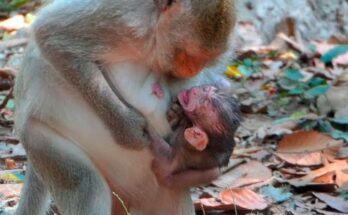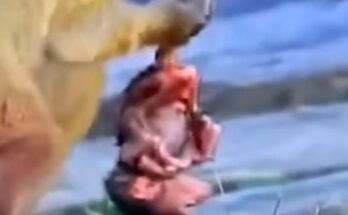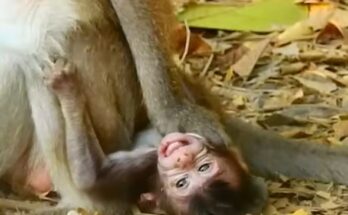In the animal kingdom, every behavior serves a purpose linked to survival and continuation of the species. One of the most fascinating examples of this is the behavior of mother monkeys weaning their newborns. While it may seem harsh from a human perspective, the decision to gradually reduce a newborn’s dependence on the mother’s milk is a calculated, instinct-driven strategy grounded in survival and natural selection.
At its core, the act of weaning is about resource management and maximizing reproductive success. For mother monkeys, energy is a precious commodity. Producing milk requires substantial energy, and while nursing provides essential nutrients to the infant during its most vulnerable stage, it is not sustainable for the mother to continue indefinitely. Eventually, she must redirect her energy reserves to prepare for future pregnancies, ensuring the continuation of her genetic lineage. In this light, weaning is not rejection—it is an evolutionary mechanism to balance the needs of the current offspring with the mother’s ability to reproduce again.
Weaning also plays a crucial role in encouraging independence and self-sufficiency in young monkeys. As they transition from mother’s milk to solid food sources found in their environment, the offspring begin to develop essential survival skills. For instance, they learn foraging techniques, recognize safe and nutritious foods, and navigate social dynamics within their troop. If a mother were to prolong nursing, it could delay this critical learning period, ultimately reducing the young monkey’s ability to thrive independently in the wild.
Another important factor is predation risk. Nursing infants are more vulnerable to predators, not just because they are physically weaker, but also because they tend to stay close to their mother and the group, which can make them easy targets. By weaning their young earlier, mother monkeys encourage them to become more mobile, agile, and alert—skills vital for evading predators. This increases the chances of survival for the infant as well as the group as a whole.
Additionally, in many monkey species, social hierarchy and competition are significant aspects of troop dynamics. Mothers who can successfully rear self-reliant, strong offspring improve not only their offspring’s chances of survival but also their own status within the group. Higher-status individuals often have better access to food, protection, and mating opportunities. Weaning is, therefore, part of a broader survival strategy that extends beyond the immediate mother-infant bond and impacts the larger social structure.
It’s important to recognize that the timing and method of weaning vary across monkey species and environments. Some mothers may gradually reduce nursing over weeks or months, while others might be more abrupt depending on ecological pressures such as food scarcity or threats from predators. This flexibility reflects the adaptability of the instinct, fine-tuned by generations of natural selection.
In essence, mother monkeys weaning their newborns is not an act of detachment but one of calculated survival. It is a balance of nurturing the young long enough to ensure they are strong, while also ensuring that both mother and infant are prepared to face the challenges of the wild independently. This deeply ingrained behavior demonstrates nature’s remarkable ability to align individual instincts with the broader goal of species survival.


